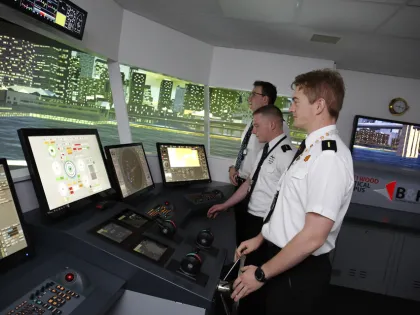
The Cadet Training and Modernisation (CT&M) Programme has completed a review of the UK’s cadet syllabus, which could shape the future of training worldwide.
It is the first time the seafarer officer qualifications syllabus has faced a major overhaul in a number of years and results are being met with enthusiasm by the industry.
The updated syllabus was completed by the CT&M Programme, which is led and coordinated by the Maritime and Coastguard Agency (MCA). It was one of the recommendations of the Seafarer Cadet Review and brought together key stakeholders, including the Merchant Navy Training Board, focused on improving cadet training.

Image credit: Fleetwood Nautical Campus
It is believed to be the first time a maritime regulator has joined forces with industry experts to shape cadet training.
The work will also be presented to the International Maritime Organization (IMO) with hopes it could lead change on an international scale.
Syllabus modules are being delivered to nautical colleges this week and are anticipated to be used from September 2025.
MCA Chief Examiner, Ajit Jacob, said:
"We were very clear from the outset that we wanted this syllabus review to be industry-led and for it not to be the MCA dictating what is needed.
"No other maritime nation has performed a review like this in conjunction with industry and what we have produced is a new collaborative model that delivers the training requirements of every sector within the industry. We will present it to the IMO next year as we are proud of what we have produced and know that other nations will benefit from this too. Well-educated and well-prepared seafarers benefit everyone, and we are happy to share our knowledge globally.
"The pace of technological change shows no signs of slowing and a new, continuous review approach will help us to stay ahead and ensure that our cadets are offered the most modern training we can give."
The review included all modules across Nautical, Engineering and Electro-Technical disciplines and was carried out throughout 2022 by a working group of representatives from nautical colleges and shipping companies, and seafarers in their fleet.
The content of the syllabuses have been updated to reflect current practices and technology used on board to ensure that cadets are being given the skills they need to operate safely at sea.
’Human element’ skills have been woven throughout the syllabus to improve their practical application on board, boost the wellbeing of seafarers, and help them to understand how their lives could be impacted on a day-to-day basis if they are implemented effectively.
-
Share


